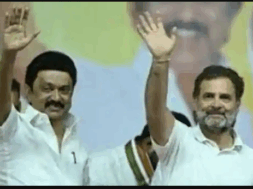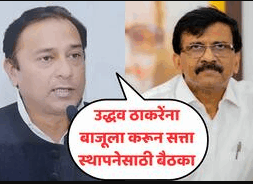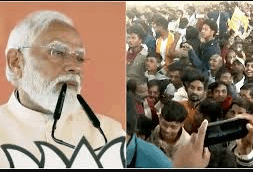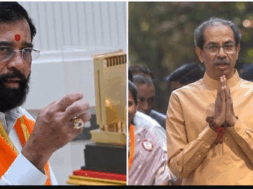
Manas Dasgupta
NEW DELHI, Apr 12: In a historic development, at least ten Bills passed by the Tamil Nadu Assembly twice since 2020 have officially become law with retrospective effect without being signed either by the governor or the president even as the Supreme Court set a deadline for the President to decide on bills referred to by governors within three months.
The bills became law after the recent Supreme Court verdict on the issue of governors sitting over the bills passed by the state Assemblies while lambasting the Tamil Nadu governor RN Ravi who refused to give his assent or sent to the president for approval at least 10 bills for the last five years. The Bench, comprising Justices JB Pardiwala and R Mahadevan, held his inaction “illegal” and “arbitrary” and said the Governor can’t reserve Bills for the President after withholding assent and added that it must be set aside.
“The action of the Governor to reserve the 10 bills for the President is illegal and arbitrary. Thus, the action is set aside. All actions taken by the Governor thereto for the 10 bills are set aside. These Bills shall be deemed to be cleared from the date it was re-presented to the Governor,” the bench said and also ruled that the President also must decide on bills referred by governors within three months and also held that the discharge of functions by the President under Article 201 was amenable to judicial review.
According to Article 201, when a governor reserves a bill, the President can either approve or reject it. However, the Constitution doesn’t specify a timeframe for this decision. The Supreme Court underscored that the President does not have a “pocket veto” and has to either grant assent or withhold it.
“The position of law is settled that even where no time-limit is prescribed for the exercise of any power under a statute, it should be exercised within a reasonable time. The exercise of powers by the President under Article 201 cannot be said to be immune to this general principle of law,” the Supreme Court said.
The Supreme Court’s two-judge bench ruled that if the President takes more than three months to decide on a bill, they must provide valid reasons for the delay and communicate them to the state.
“We prescribe that the President is required to decide on the bills reserved for his consideration by the governor within three months from the date on which such reference is received,” the SC said.
The apex court added that if the President fails to act within the timeframe, the affected states can seek legal recourse and approach the courts for resolution.
If a bill’s constitutional validity is questioned, the Supreme Court emphasised that the executive shouldn’t act as a judge. Instead, such issues should be referred to the Supreme Court under Article 143 for a determination.
“We have no qualms in stating that the hands of the executive are tied when engaging with purely legal issues in a bill and only the constitutional courts have the prerogative to study and provide recommendations as regards the constitutionality of a bill,” the Supreme Court said.
The 10 bills, including two which were passed by the previous AIADMK government, become laws with effect from November 18, 2023 after the state government issued gazette notifications to that effect. They include amended rules on the appointment of Vice Chancellors of state-run universities. They reduce the power of the Governor to make such appointments.
The Governor had earlier twice returned these bills to spark a political row, prompting a furious Tamil Nadu Assembly to hold a special session to re-pass – unanimously – the bills and re-send them to him. But the Governor still withheld assent and three years later referred them to the President. The long-running squabble had been viewed unfavourably by the Supreme Court, which repeatedly questioned Mr Ravi why it took him three years to find some fault with the bills to refuse assent.
That was a month after the court made strong observations and asked the state government and the Governor to resolve their differences. “Otherwise, we will resolve it,” the court had said. The DMK had first approached the Supreme Court in 2023 asking for directions to the Governor to clear the 10 bills. Chief Minister MK Stalin’s party accused Mr Ravi – who was appointed by the BJP – of deliberately delaying the bills and scuttling development by “undermining the elected administration.”
Mr Stalin had hailed the Supreme Court verdict as “historical” and said, “This is a big victory for all Indian states…” referring to similar disputes involving the governors in several other non-BJP ruled states.
It was also for the first time that the Supreme Court has prescribed a timeline for the president to decide on the bills reserved for her consideration by the governor within a period of three months from the date on which such reference is received. The judgement on the DMK government’s petition running into 415 pages was uploaded on the top court’s website at 10.54 pm on Friday.
“We deem it appropriate to adopt the timeline prescribed by the Ministry of Home Affairs… and prescribe that the President is required to take a decision on the bills reserved for his consideration by the Governor within a period of three months from the date on which such reference is received. In case of any delay beyond this period, appropriate reasons would have to be recorded and conveyed to the concerned State. The States are also required to be collaborative and extend co-operation by furnishing answers to the queries which may be raised and consider the suggestions made by the Central government expeditiously,” the top court said.
“The Bills, having been pending with the Governor for an unduly long period of time, and the Governor having acted with clear lack of bona fides in reserving the Bills for the consideration of the President, immediately after the pronouncement of the decision of this Court in State of Punjab (supra), are deemed to have been assented to by the Governor on the date when they were presented to him after being reconsidered. There is no expressly specified time-limit for the discharge of the functions by the Governor under Article 200 of the Constitution. Despite there being no prescribed time-limit, Article 200 cannot be read in a manner which allows the Governor to not take action upon bills which are presented to him for assent and thereby delay and essentially roadblock the law-making machinery in the State,” the bench said in its judgement while directing the registry to send a copy each of this judgment to all the high courts and the principal secretaries to the governors of all states.
Senior advocate and DMK’s Rajya Sabha MP P Wilson claimed that with the 10 bills coming into effect, the state government’s nominee would become the Chancellor of the state-run University, while Ravi will be removed.
The apex court’s judgement, however, was criticised by the Kerala governor Rajendra Vishwanath Arlekar terming as “overreach” the court setting a timeline for the governors to act on bills and said Parliament must take a call on issues such as clearance of Bills.
Mr Arlekar, weighing in on the apex court verdict terming Tamil Nadu governor RN Ravi’s conduct in dealing with Bills ‘illegal’ and ‘arbitrary’, said while the observation was “understandable,” it wasn’t implied in the Constitution that the governor must clear Bills in a stipulated time period.
Noting that the bench that heard the matter “should have referred it to a Constitution bench,” Mr Arlekar said setting of a time limit was a constitutional amendment, and “if the Constitutional amendment is being done by the court, why are legislature and Parliament needed?” The Kerala governor termed the move an “overreach” and said if courts could keep cases pending for years due to certain reasons that SC judges may have, “the governor may have his own reasons” for taking time to clear a particular Bill.














